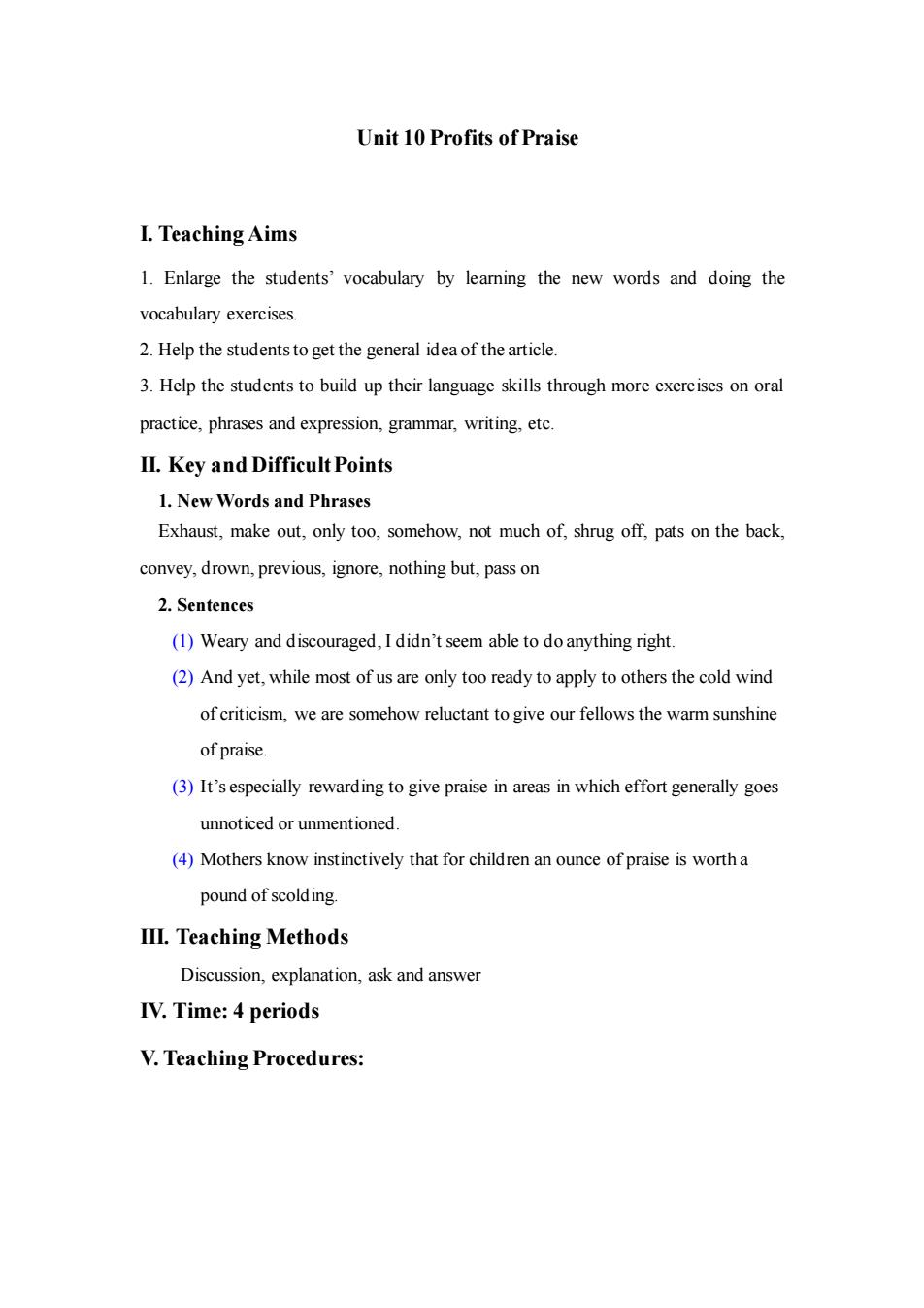
Unit 10 Profits of Praise I.Teaching Aims 1.Enlarge the students'vocabulary by learning the new words and doing the vocabulary exercises. 2.Help the studentstoget the general ideaof thearticle. 3.Help the students to build up their language skills through more exercises on oral practice,phrases and expression,grammar,writing,etc. II.Key and Difficult Points 1.New Words and Phrases Exhaust,make out,only too,somehow,not much of,shrug off,pats on the back. convey,drown,previous,ignore,nothing but,pass on 2.Sentences (1)Weary and discouraged,I didn't seem able to doanything right (2)And yet,while most of us are only too ready to apply to others the cold wind of criticism,we are somehow reluctant to give our fellows the warm sunshine of praise. (3)It's especially rewarding to give praise in areas in which effort generally goes unnoticed or unmentioned. (4)Mothers know instinctively that for children an ounce of praise is wortha pound of scolding. IIL.Teaching Methods Discussion,explanation,ask and answer IV.Time:4 periods V.Teaching Procedures:
Unit 10 Profits of Praise I. Teaching Aims 1. Enlarge the students’ vocabulary by learning the new words and doing the vocabulary exercises. 2. Help the students to get the general idea of the article. 3. Help the students to build up their language skills through more exercises on oral practice, phrases and expression, grammar, writing, etc. II. Key and Difficult Points 1. New Words and Phrases Exhaust, make out, only too, somehow, not much of, shrug off, pats on the back, convey, drown, previous, ignore, nothing but, pass on 2. Sentences (1) Weary and discouraged, I didn’t seem able to do anything right. (2) And yet, while most of us are only too ready to apply to others the cold wind of criticism, we are somehow reluctant to give our fellows the warm sunshine of praise. (3) It’s especially rewarding to give praise in areas in which effort generally goes unnoticed or unmentioned. (4) Mothers know instinctively that for children an ounce of praise is worth a pound of scolding. III. Teaching Methods Discussion, explanation, ask and answer IV. Time: 4 periods V. Teaching Procedures:
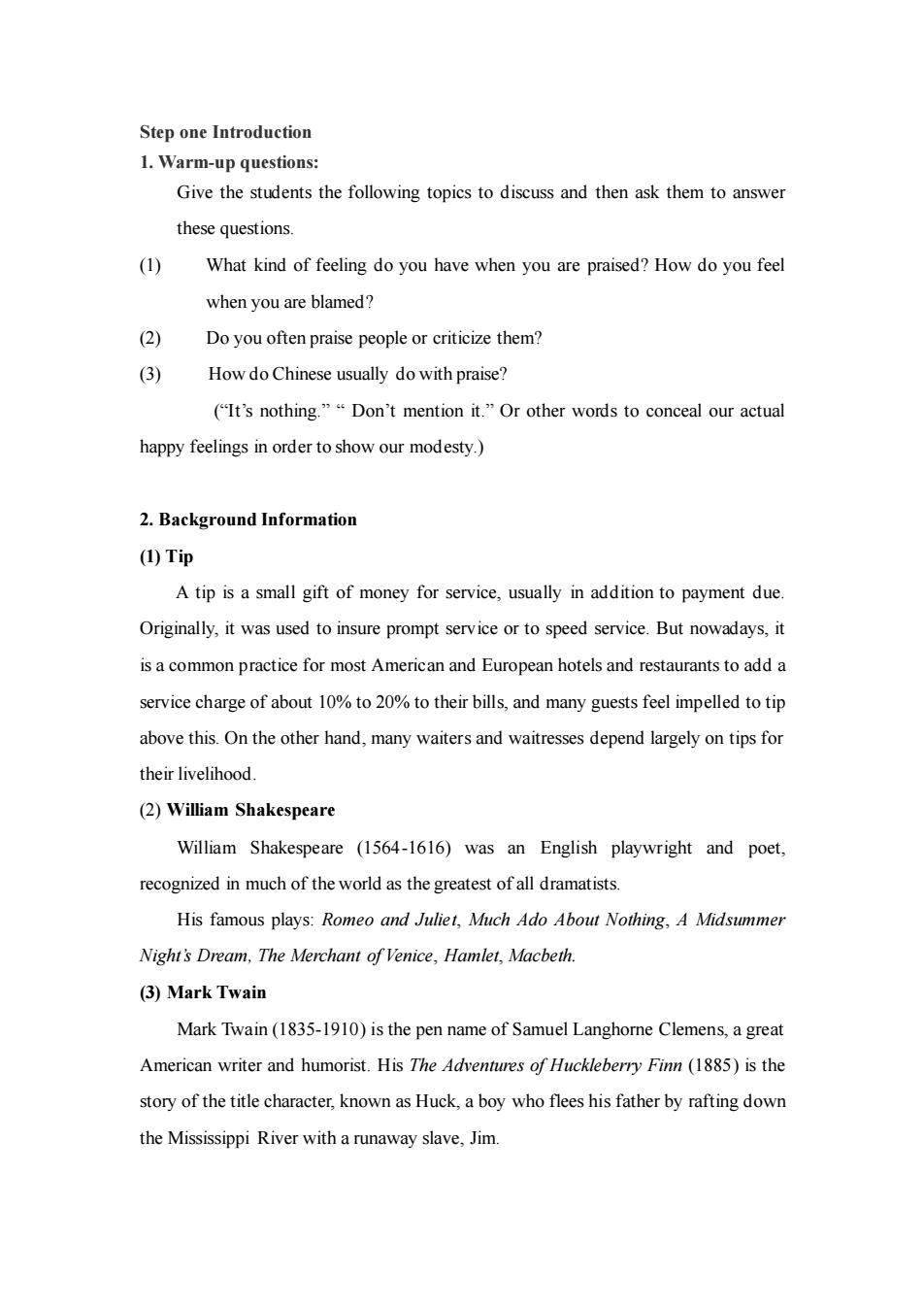
Step one Introduction 1.Warm-up questions: Give the students the following topics to discuss and then ask them to answer these questions (1)What kind of feeling do you have when you are praised?How do you feel when you are blamed? (2) Doyou often praise people or criticize them? (3) How do Chinese usually do with praise? ("It's nothing.""Don't mention it."Or other words to conceal our actual happy feelings in order to show our modesty.) 2.Background Information (I)Tip A tip is a small gift of money for service,usually in addition to payment due Originally,it was used to insure prompt service or to speed service.But nowadays,it is a common practice for most American and European hotels and restaurants to add a service charge of about 10%to 20%to their bills,and many guests feel impelled to tip above this.On the other hand,many waiters and waitresses depend largely on tips for their livelihood. (2)William Shakespeare William Shakespeare (1564-1616)was an English playwright and poet. recognized in much of the world as the greatest of all dramatists. His famous plays:Romeo and Juliet,Much Ado About Nothing,A Midsummer Night's Dream,The Merchant of Venice,Hamlet,Macbeth. (③)Mark Twain Mark Twain(1835-1910)is the pen name of Samuel Langhorne Clemens,a great American writer and humorist.His The Adventures of Huckleberry Finn(1885)is the story of the title character,known as Huck,a boy who flees his father by rafting down the Mississippi River with a runaway slave.im
Step one Introduction 1. Warm-up questions: Give the students the following topics to discuss and then ask them to answer these questions. (1) What kind of feeling do you have when you are praised? How do you feel when you are blamed? (2) Do you often praise people or criticize them? (3) How do Chinese usually do with praise? (“It’s nothing.” “ Don’t mention it.” Or other words to conceal our actual happy feelings in order to show our modesty.) 2. Background Information (1) Tip A tip is a small gift of money for service, usually in addition to payment due. Originally, it was used to insure prompt service or to speed service. But nowadays, it is a common practice for most American and European hotels and restaurants to add a service charge of about 10% to 20% to their bills, and many guests feel impelled to tip above this. On the other hand, many waiters and waitresses depend largely on tips for their livelihood. (2) William Shakespeare William Shakespeare (1564-1616) was an English playwright and poet, recognized in much of the world as the greatest of all dramatists. His famous plays: Romeo and Juliet, Much Ado About Nothing, A Midsummer Night’s Dream, The Merchant of Venice, Hamlet, Macbeth. (3) Mark Twain Mark Twain (1835-1910) is the pen name of Samuel Langhorne Clemens, a great American writer and humorist. His The Adventures of Huckleberry Finn (1885) is the story of the title character, known as Huck, a boy who flees his father by rafting down the Mississippi River with a runaway slave, Jim
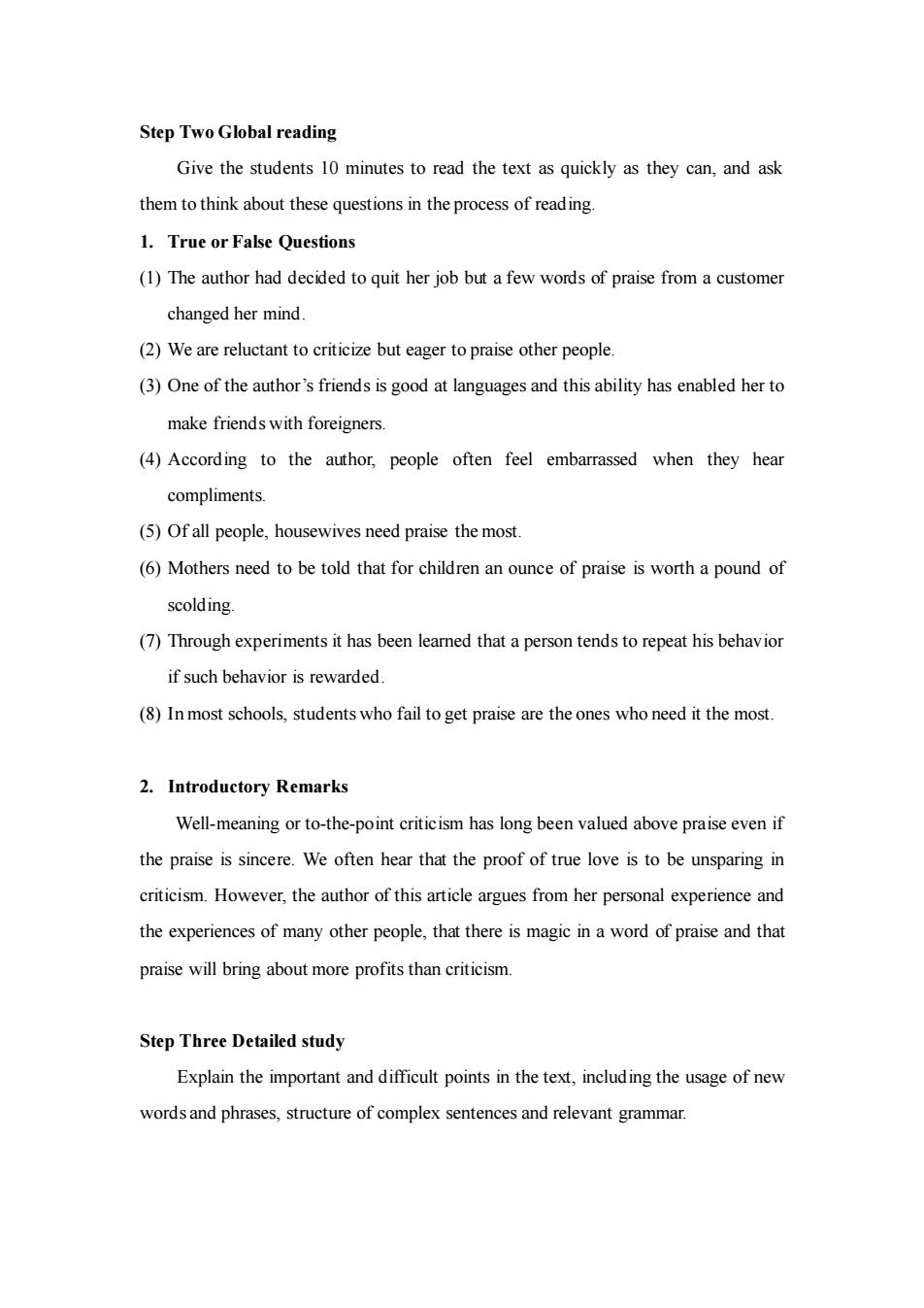
Step Two Global reading Give the students 10 minutes to read the text as quickly as they can,and ask them to think about these questions in the process of reading. 1.True or False Questions (1)The author had decided to quit her job but a few words of praise from a customer changed her mind. (2)We are reluctant to criticize but eager to praise other people (3)One of the author's friends is good at languages and this ability has enabled her to make friends with foreigners. (4)According to the author,people often feel embarrassed when they hear compliments. (5)Ofall people,housewives need praise the most. (6)Mothers need to be told that for children an ounce of praise is worth a pound of scolding (7)Through experiments it has been leamned that a person tends to repeat his behavior if such behavior is rewarded. (8)In most schools,students who fail to get praise are the ones who need it the most. 2.Introductory Remarks Well-meaning or to-the-point criticism has long been valued above praise even if the praise is sincere.We often hear that the proof of true love is to be unsparing in criticism.However,the author of this article argues from her personal experience and the experiences of many other people,that there is magic in a word of praise and that praise will bring about more profits than criticism Step Three Detailed study Explain the important and difficult points in the text,including the usage of new words and phrases,structure of complex sentences and relevant grammar
Step Two Global reading Give the students 10 minutes to read the text as quickly as they can, and ask them to think about these questions in the process of reading. 1. True or False Questions (1) The author had decided to quit her job but a few words of praise from a customer changed her mind. (2) We are reluctant to criticize but eager to praise other people. (3) One of the author’s friends is good at languages and this ability has enabled her to make friends with foreigners. (4) According to the author, people often feel embarrassed when they hear compliments. (5) Of all people, housewives need praise the most. (6) Mothers need to be told that for children an ounce of praise is worth a pound of scolding. (7) Through experiments it has been learned that a person tends to repeat his behavior if such behavior is rewarded. (8) In most schools, students who fail to get praise are the ones who need it the most. 2. Introductory Remarks Well-meaning or to-the-point criticism has long been valued above praise even if the praise is sincere. We often hear that the proof of true love is to be unsparing in criticism. However, the author of this article argues from her personal experience and the experiences of many other people, that there is magic in a word of praise and that praise will bring about more profits than criticism. Step Three Detailed study Explain the important and difficult points in the text, including the usage of new words and phrases, structure of complex sentences and relevant grammar

1.It was the end of my exhausting first day as waitress in a busy New York restaurant Exhaust I)to make you feel tired使筋疲力尽,使疲惫不堪 e.g Even a short walk exhausted her. 2)use up用完,花光,耗尽 e.g.The King soon exhausted every penny in the national treasury. n.1)waste gases that come out ofa vehicle,an engine,or a machine 2)a pipe through which exhaust gases come out排气管 exhausting adj.making you feel very tired exhausted adj.very tired e.g.The exhausting day really made me completely exhausted The experiment is very time-consuming and exhausting 这项实验既费时又费力。 2.Weary and discouraged,I didn'tseem able to doanything right Grammar:"Weary and discouraged"is used as an adverbial of cause e.g.Modest and easy to approach,Einstein soon put the young visitor at eas Not discouraged by failures,they went on with their experiment. 3.As I made out a complicated check for a family with several children who had changed their ice-cream order a dozen times,I was ready to quit. ()write in a complete form,fill out开具,填写(表格或文件) Could you make out a detailed list for me? The teacher made out a list of books for students to read (2)understand理解,明白(事理) I just couldn't make out how the fire started I can't make out what she wants
1. It was the end of my exhausting first day as waitress in a busy New York restaurant. Exhaust v. 1) to make you feel tired 使筋疲力尽,使疲惫不堪 e.g. Even a short walk exhausted her. 2) use up 用完,花光,耗尽 e.g. The King soon exhausted every penny in the national treasury. n. 1) waste gases that come out of a vehicle, an engine, or a machine 废气 2) a pipe through which exhaust gases come out 排气管 exhausting adj. making you feel very tired exhausted adj. very tired e.g. The exhausting day really made me completely exhausted. The experiment is very time-consuming and exhausting. 这项实验既费时又费力。 2. Weary and discouraged, I didn’t seem able to do anything right. Grammar: “Weary and discouraged” is used as an adverbial of cause. e.g. Modest and easy to approach, Einstein soon put the young visitor at ease. Not discouraged by failures, they went on with their experiment. 3. As I made out a complicated check for a family with several children who had changed their ice-cream order a dozen times, I was ready to quit. (1) write in a complete form, fill out 开具,填写(表格或文件) Could you make out a detailed list for me? The teacher made out a list of books for students to read. (2) understand 理解,明白(事理) I just couldn’t make out how the fire started. I can’t make out what she wants
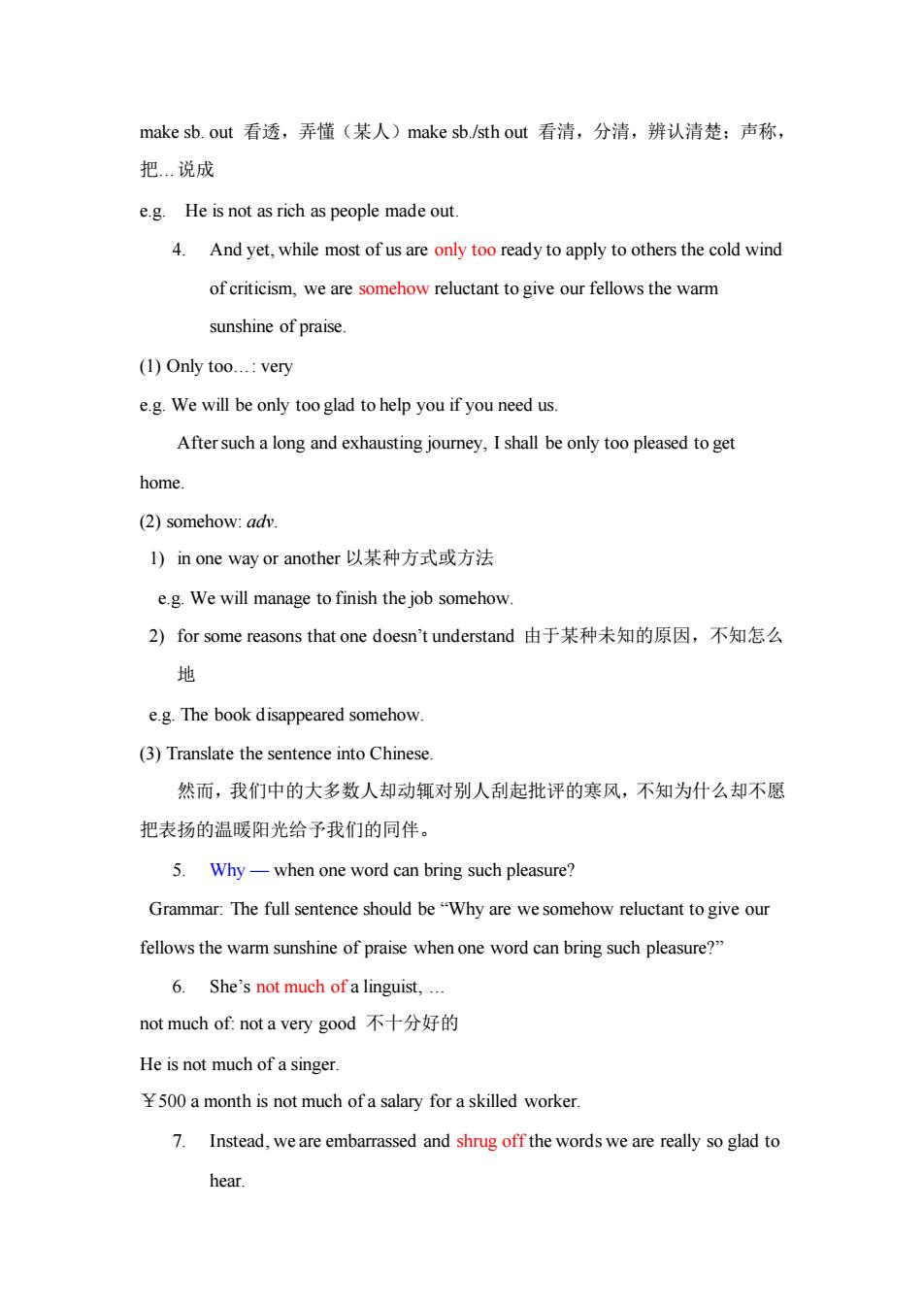
make sb.out看透,弄懂(某人)make sb./sth out看清,分清,辨认清楚:声称, 把.说成 e.g.He is not as rich as people made out. 4.And yet,while most of us are only too ready to apply to others the cold wind of criticism,we are somehow reluctant to give our fellows the warm sunshine of praise (1)Only too...:very e.g.We will be only too glad to help you if you need us Aftersuch a long and exhausting joumey,I shall be only too pleased to get home (2)somehow:adv. I)in one way or another以某种方式或方法 e.g.We will manage to finish the job somehow. 2)for some reasons that one doesn't understand由于某种未知的原因,不知怎么 地 e.g.The book disappeared somehow. (3)Translate the sentence into Chinese. 然而,我们中的大多数人却动辄对别人刮起批评的寒风,不知为什么却不愿 把表扬的温暖阳光给予我们的同伴。 5.Why-when one word can bring such pleasure? Grammar.The full sentence should be"Why are wesomehow reluctant to give our fellows the warm sunshine of praise when one word can bring such pleasure?" 6.She's not much of a linguist,... not much of:not a very good不十分好的 He is not much of a singer. Y500 a month is not much of a salary for a skilled worker. 7.Instead,weare embarrassed and shrug off the words we are really so glad to hear
make sb. out 看透,弄懂(某人)make sb./sth out 看清,分清,辨认清楚;声称, 把…说成 e.g. He is not as rich as people made out. 4. And yet, while most of us are only too ready to apply to others the cold wind of criticism, we are somehow reluctant to give our fellows the warm sunshine of praise. (1) Only too…: very e.g. We will be only too glad to help you if you need us. After such a long and exhausting journey, I shall be only too pleased to get home. (2) somehow: adv. 1) in one way or another 以某种方式或方法 e.g. We will manage to finish the job somehow. 2) for some reasons that one doesn’t understand 由于某种未知的原因,不知怎么 地 e.g. The book disappeared somehow. (3) Translate the sentence into Chinese. 然而,我们中的大多数人却动辄对别人刮起批评的寒风,不知为什么却不愿 把表扬的温暖阳光给予我们的同伴。 5. Why — when one word can bring such pleasure? Grammar: The full sentence should be “Why are we somehow reluctant to give our fellows the warm sunshine of praise when one word can bring such pleasure?” 6. She’s not much of a linguist, … not much of: not a very good 不十分好的 He is not much of a singer. ¥500 a month is not much of a salary for a skilled worker. 7. Instead, we are embarrassed and shrug off the words we are really so glad to hear
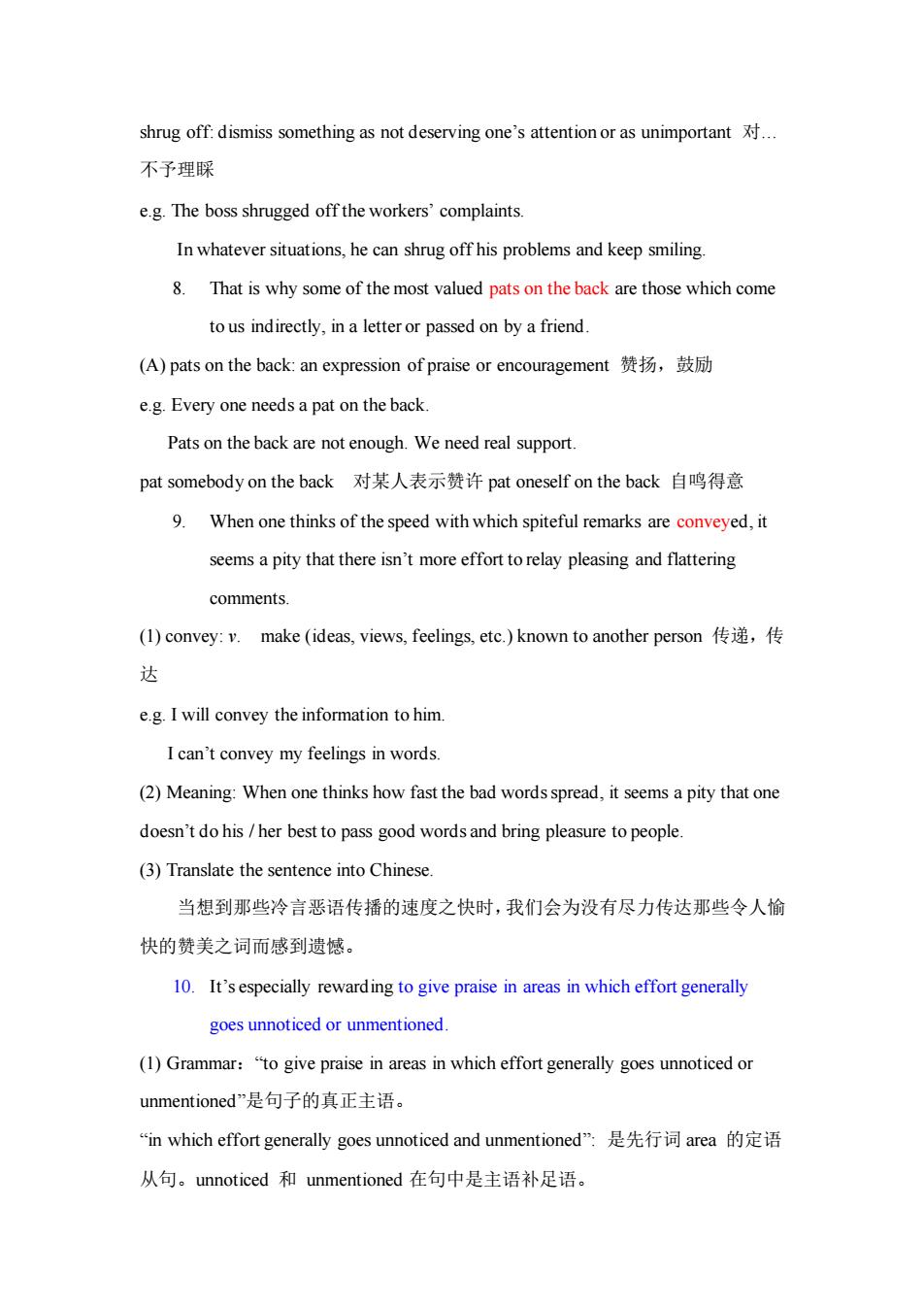
shrug off:dismiss something as not deserving one's attention or as unimportant 不予理睬 e.g.The boss shrugged off the workers'complaints. In whatever situations,he can shrug offhis problems and keep smiling 8.That is why some of the most valued pats on the back are those which come tous indirectly,in a letteror passed on by a friend. (A)pats on the back:an expression of praise or encouragement赞扬,鼓励 e.g.Every one needs a pat on the back. Pats on the back are not enough.We need real support. pat somebody on the back对某人表示赞许pat oneself on the back自鸣得意 9.When one thinks of the speed with which spiteful remarks are conveyed,it seems a pity that there isn't more effort to relay pleasing and flattering comments. ()convey:.make((ideas,views,feelings,etc.)known to another person传递,传 达 e.g I will convey the information to him I can't convey my feelings in words. (2)Meaning:When one thinks how fast the bad wordsspread.it seems a pity that one doesn't do his/her best to pass good words and bring pleasure to people. (3)Translate the sentence into Chinese 当想到那些冷言恶语传播的速度之快时,我们会为没有尽力传达那些令人榆 快的赞美之词而感到遗憾。 10.It's especially rewarding to give praise in areas in which effort generally goes unnoticed or unmentioned. (1)Grammar:"to give praise in areas in which effort generally goes unnoticed or unmentioned"是句子的真正主语。 “in which effort generally goes unnoticed and unmentioned:是先行词area的定语 从句。unnoticed和unmentioned在句中是主语补足语
shrug off: dismiss something as not deserving one’s attention or as unimportant 对… 不予理睬 e.g. The boss shrugged off the workers’ complaints. In whatever situations, he can shrug off his problems and keep smiling. 8. That is why some of the most valued pats on the back are those which come to us indirectly, in a letter or passed on by a friend. (A) pats on the back: an expression of praise or encouragement 赞扬,鼓励 e.g. Every one needs a pat on the back. Pats on the back are not enough. We need real support. pat somebody on the back 对某人表示赞许 pat oneself on the back 自鸣得意 9. When one thinks of the speed with which spiteful remarks are conveyed, it seems a pity that there isn’t more effort to relay pleasing and flattering comments. (1) convey: v. make (ideas, views, feelings, etc.) known to another person 传递,传 达 e.g. I will convey the information to him. I can’t convey my feelings in words. (2) Meaning: When one thinks how fast the bad words spread, it seems a pity that one doesn’t do his / her best to pass good words and bring pleasure to people. (3) Translate the sentence into Chinese. 当想到那些冷言恶语传播的速度之快时,我们会为没有尽力传达那些令人愉 快的赞美之词而感到遗憾。 10. It’s especially rewarding to give praise in areas in which effort generally goes unnoticed or unmentioned. (1) Grammar:“to give praise in areas in which effort generally goes unnoticed or unmentioned”是句子的真正主语。 “in which effort generally goes unnoticed and unmentioned”: 是先行词 area 的定语 从句。unnoticed 和 unmentioned 在句中是主语补足语
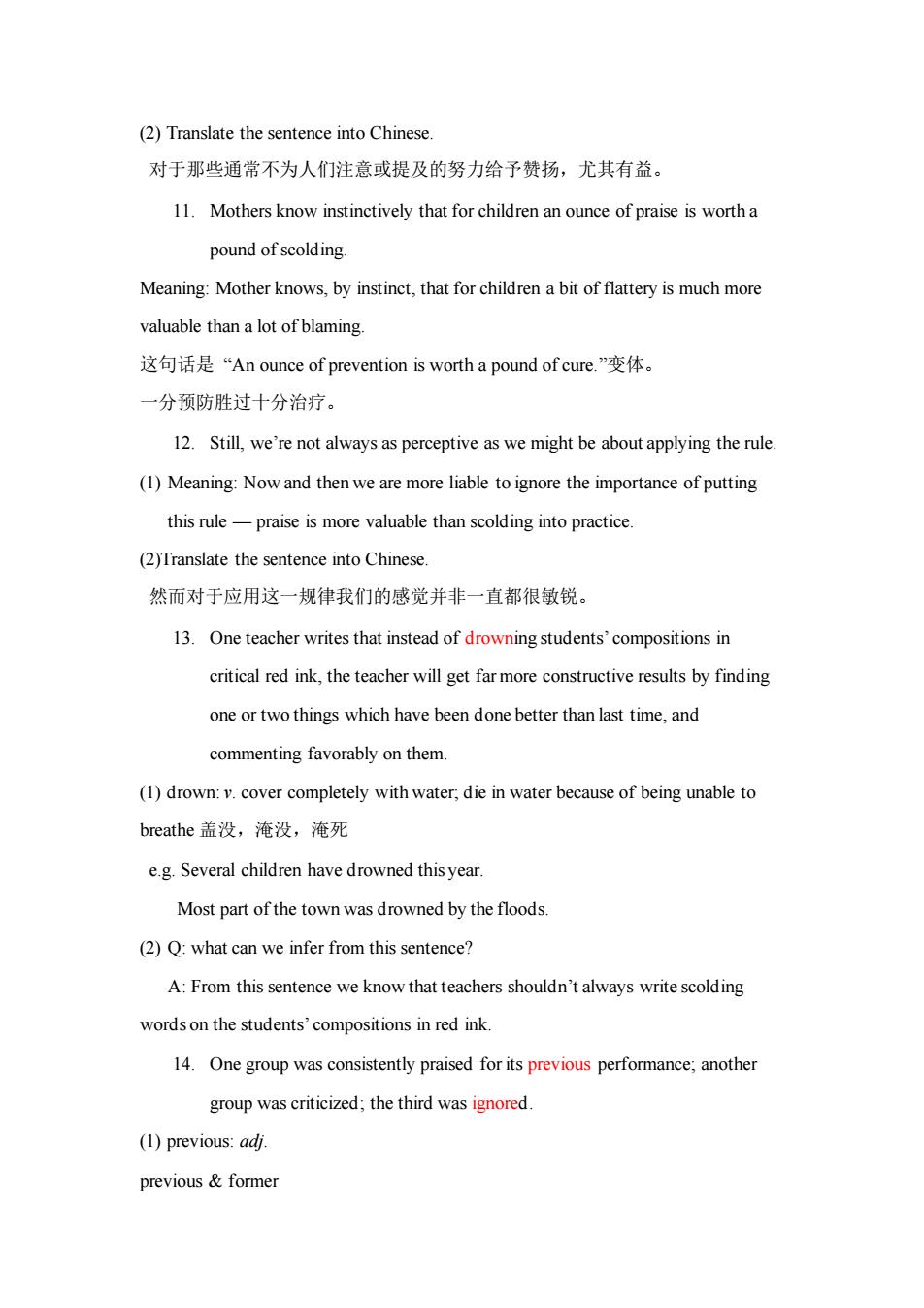
(2)Translate the sentence into Chinese. 对于那些通常不为人们注意或提及的努力给予赞扬,尤其有益。 11.Mothers know instinctively that for children an ounce of praise is wortha pound of scolding Meaning:Mother knows,by instinct,that for children a bit of flattery is much more valuable than a lot of blaming. 这句话是“An ounce of prevention is worth a pound of cure..”变体。 一分预防胜过十分治疗。 12.Still,we're not always as perceptive as we might be about applying the rule. (1)Meaning:Now and then we are more liable to ignore the importance of putting this rule-praise is more valuable than scolding into practice. (2)Translate the sentence into Chinese 然而对于应用这一规律我们的感觉并非一直都很敏锐。 13.One teacher writes that instead of drowning students'compositions in critical red ink,the teacher will get far more constructive results by finding one or two things which have been done better than last time,and commenting favorably on them. (1)drown:v.cover completely with water,die in water because of being unable to breathe盖没,淹没,淹死 e.g.Several children have drowned thisyear Most part of the town was drowned by the floods. (2)Q:what can we infer from this sentence? A:From this sentence we know that teachers shouldn't always write scolding words on the students'compositions in red ink. 14.One group was consistently praised for its previous performance;another group was criticized;the third was ignored. (1)previous:adj. previous&former
(2) Translate the sentence into Chinese. 对于那些通常不为人们注意或提及的努力给予赞扬,尤其有益。 11. Mothers know instinctively that for children an ounce of praise is worth a pound of scolding. Meaning: Mother knows, by instinct, that for children a bit of flattery is much more valuable than a lot of blaming. 这句话是 “An ounce of prevention is worth a pound of cure.”变体。 一分预防胜过十分治疗。 12. Still, we’re not always as perceptive as we might be about applying the rule. (1) Meaning: Now and then we are more liable to ignore the importance of putting this rule — praise is more valuable than scolding into practice. (2)Translate the sentence into Chinese. 然而对于应用这一规律我们的感觉并非一直都很敏锐。 13. One teacher writes that instead of drowning students’ compositions in critical red ink, the teacher will get far more constructive results by finding one or two things which have been done better than last time, and commenting favorably on them. (1) drown: v. cover completely with water; die in water because of being unable to breathe 盖没,淹没,淹死 e.g. Several children have drowned this year. Most part of the town was drowned by the floods. (2) Q: what can we infer from this sentence? A: From this sentence we know that teachers shouldn’t always write scolding words on the students’ compositions in red ink. 14. One group was consistently praised for its previous performance; another group was criticized; the third was ignored. (1) previous: adj. previous & former
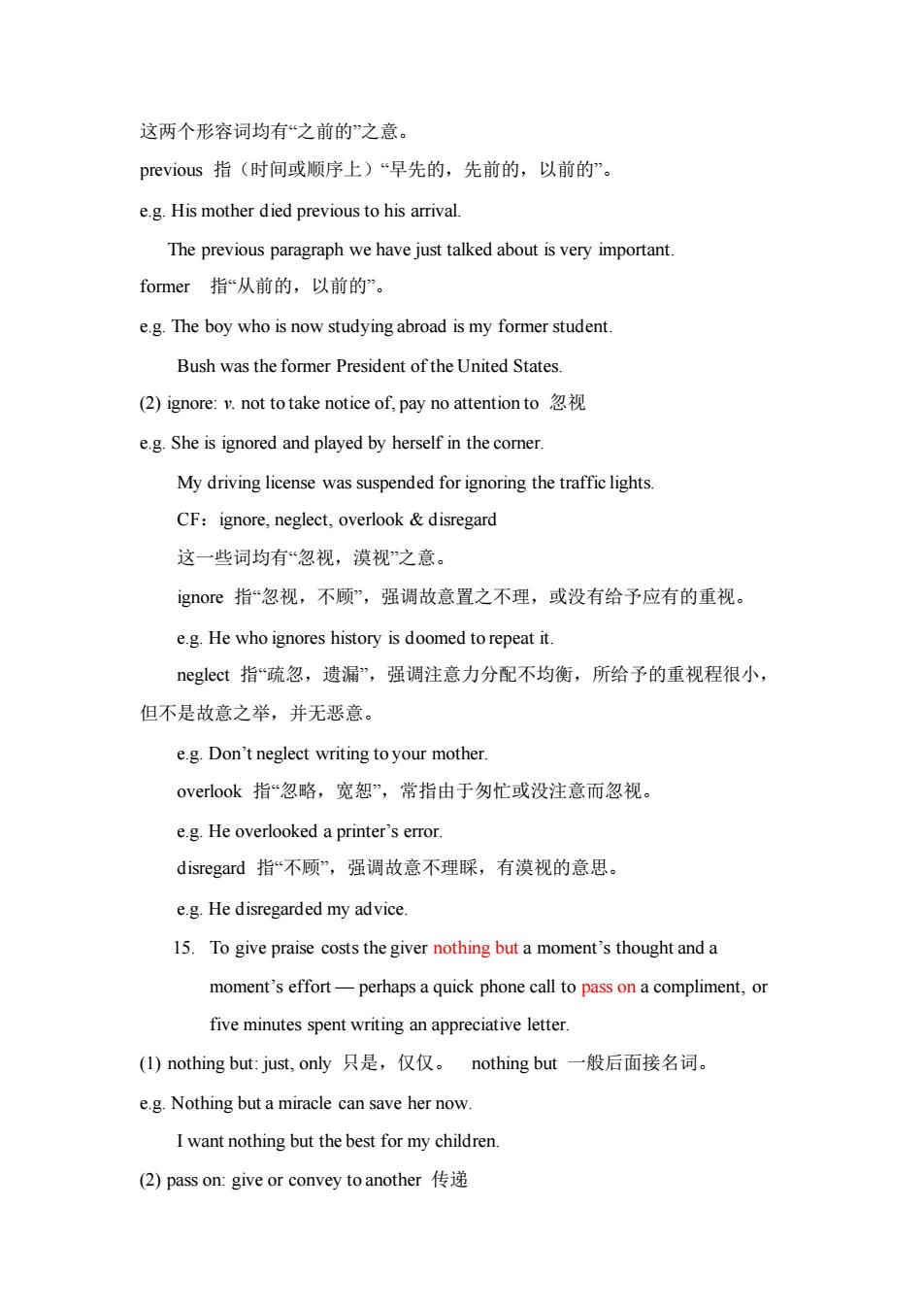
这两个形容词均有“之前的”之意。 previous指(时间或顺序上)“早先的,先前的,以前的。 e.g.His mother died previous to his arrival. The previous paragraph we have just talked about is very important former指从前的,以前的”。 e.g The boy who is now studying abroad is my former student Bush was the former President of the United States. (2)ignore:v.not totake notice of,pay no attention to e.g.She is ignored and played by herself in the comer. My driving license was suspended for ignoring the traffic lights CF:ignore,neglect,overlook&disregard 这一些词均有“忽视,漠视”之意。 gnoe指“忽视,不顾”,强调故意置之不理,或没有给予应有的重视。 e.g.He who ignores history is doomed torepeat it. neglect指疏忽,遗漏”,强调注意力分配不均衡,所给予的重视程很小, 但不是故意之举,并无恶意。 e.g.Don't neglect writing to your mother. overlook指“忽略,宽恕,常指由于匆忙或没注意而忽视。 e.g.He overlooked a printer's error. disregard指“不顾”,强调故意不理睬,有漠视的意思。 e.g.He disregarded my advice. 15.To give praise costs the giver nothing but a moment's thought and a moment's effort-perhaps a quick phone call to pass on a compliment,or five minutes spent writing an appreciative letter (I)nothing but::just,only只是,仅仅。nothing but一般后面接名词。 e.g.Nothing but a miracle can save her now I want nothing but the best for my children. (2)pass on:give or convey toanother传递
这两个形容词均有“之前的”之意。 previous 指(时间或顺序上)“早先的,先前的,以前的”。 e.g. His mother died previous to his arrival. The previous paragraph we have just talked about is very important. former 指“从前的,以前的”。 e.g. The boy who is now studying abroad is my former student. Bush was the former President of the United States. (2) ignore: v. not to take notice of, pay no attention to 忽视 e.g. She is ignored and played by herself in the corner. My driving license was suspended for ignoring the traffic lights. CF:ignore, neglect, overlook & disregard 这一些词均有“忽视,漠视”之意。 ignore 指“忽视,不顾”,强调故意置之不理,或没有给予应有的重视。 e.g. He who ignores history is doomed to repeat it. neglect 指“疏忽,遗漏”,强调注意力分配不均衡,所给予的重视程很小, 但不是故意之举,并无恶意。 e.g. Don’t neglect writing to your mother. overlook 指“忽略,宽恕”,常指由于匆忙或没注意而忽视。 e.g. He overlooked a printer’s error. disregard 指“不顾”,强调故意不理睬,有漠视的意思。 e.g. He disregarded my advice. 15. To give praise costs the giver nothing but a moment’s thought and a moment’s effort — perhaps a quick phone call to pass on a compliment, or five minutes spent writing an appreciative letter. (1) nothing but: just, only 只是,仅仅。 nothing but 一般后面接名词。 e.g. Nothing but a miracle can save her now. I want nothing but the best for my children. (2) pass on: give or convey to another 传递
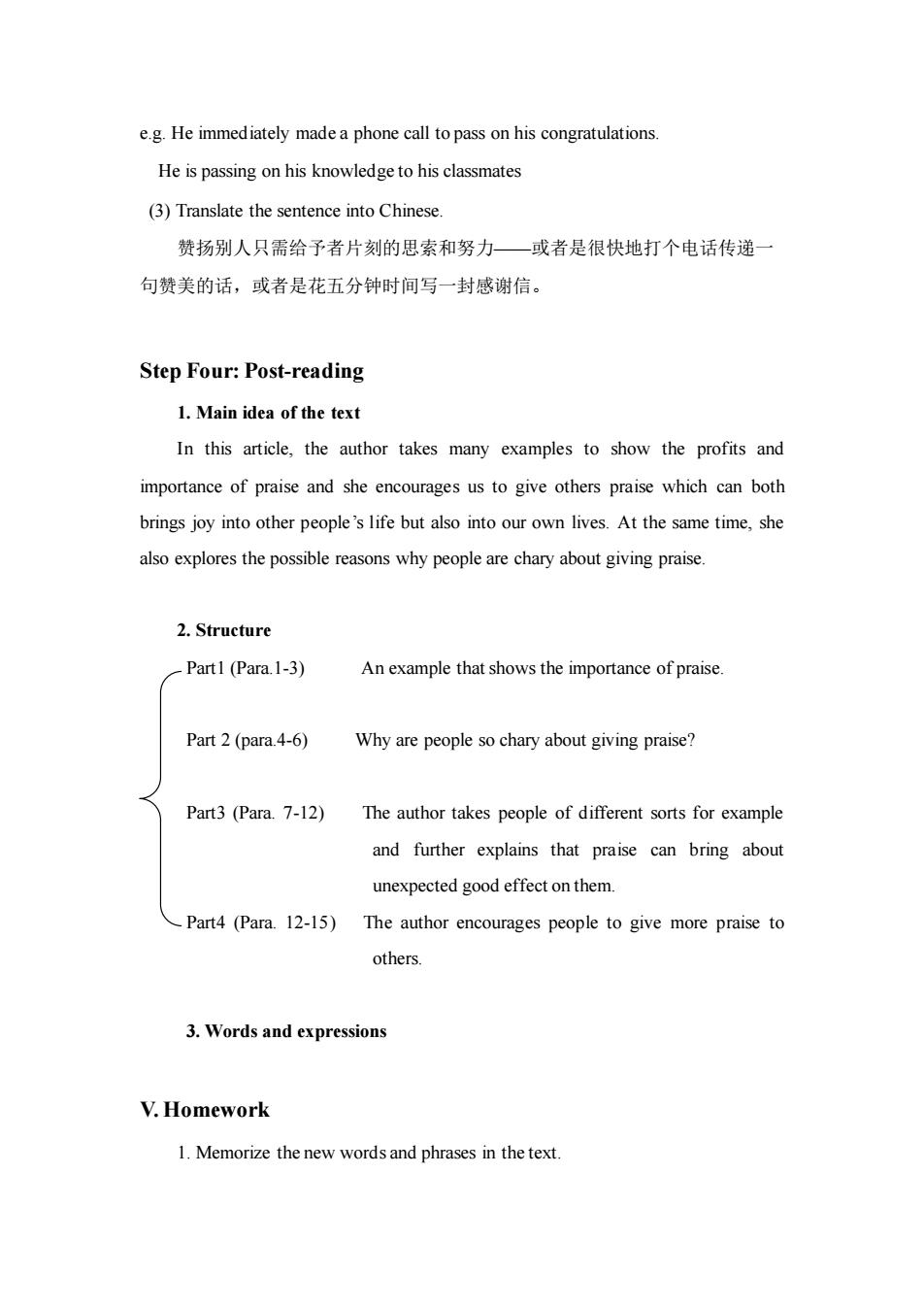
e.g.He immediately made a phone call to pass on his congratulations. He is passing on his knowledge to his classmates (3)Translate the sentence into Chinese. 赞扬别人只需给予者片刻的思索和努力—或者是很快地打个电话传递一 句赞美的话,或者是花五分钟时间写一封感谢信。 Step Four:Post-reading 1.Main idea of the text In this article,the author takes many examples to show the profits and importance of praise and she encourages us to give others praise which can both brings joy into other people's life but also into our own lives.At the same time,she also explores the possible reasons why people are chary about giving praise. 2.Structure -Part1(Para.1-3) An example that shows the importance of praise Part 2(para4-6) Why are people so chary about giving praise? Part3 (Para.7-12)The author takes people of different sorts for example and further explains that praise can bring about unexpected good effect on them. Part4(Para.12-15)The author encourages people to give more praise to others. 3.Words and expressions V.Homework 1.Memorize the new words and phrases in the text
e.g. He immediately made a phone call to pass on his congratulations. He is passing on his knowledge to his classmates (3) Translate the sentence into Chinese. 赞扬别人只需给予者片刻的思索和努力——或者是很快地打个电话传递一 句赞美的话,或者是花五分钟时间写一封感谢信。 Step Four: Post-reading 1. Main idea of the text In this article, the author takes many examples to show the profits and importance of praise and she encourages us to give others praise which can both brings joy into other people’s life but also into our own lives. At the same time, she also explores the possible reasons why people are chary about giving praise. 2. Structure Part1 (Para.1-3) An example that shows the importance of praise. Part 2 (para.4-6) Why are people so chary about giving praise? Part3 (Para. 7-12) The author takes people of different sorts for example and further explains that praise can bring about unexpected good effect on them. Part4 (Para. 12-15) The author encourages people to give more praise to others. 3. Words and expressions V. Homework 1. Memorize the new words and phrases in the text

2.Do exercises on p249-258 3.Leamn the text in"Reading Activity"by yourself. 4.Write a paragraph of 120-150 words arguing that praise is more profitable than criticism. VI.References 1.College English Intensive Reading 2,Zhai Xiangjun(ed.),Shanghai Foreign Language Education Press,2006. 2.College English Intensive Reading 2,(Teacher's Book),Zhang Zengjian(ed.), Shanghai Foreign Language Education Press,2006. 3.Oxford Advanced Leamer's English-Chinese Dictionary (6h edition).Oxford university press&The Commercial Press,2004. 4.大学英语语法.薄冰主编.山西:山西教有出版社,2006. 5.大学英语实用语法讲解与练习.任福洪等主编。北京:国防工业出版社 2004
2. Do exercises on p249-258 3. Learn the text in “Reading Activity” by yourself. 4. Write a paragraph of 120-150 words arguing that praise is more profitable than criticism. VI.References 1. College English Intensive Reading 2, Zhai Xiangjun(ed.), Shanghai Foreign Language Education Press, 2006. 2. College English Intensive Reading 2, (Teacher’s Book), Zhang Zengjian(ed.), Shanghai Foreign Language Education Press, 2006. 3. Oxford Advanced Learner’s English-Chinese Dictionary(6 th edition), Oxford university press﹠The Commercial Press, 2004. 4. 大学英语语法. 薄冰 主编. 山西:山西教育出版社,2006. 5. 大学英语实用语法讲解与练习. 任福洪等主编. 北京:国防工业出版社, 2004